February 12
Charles Darwin
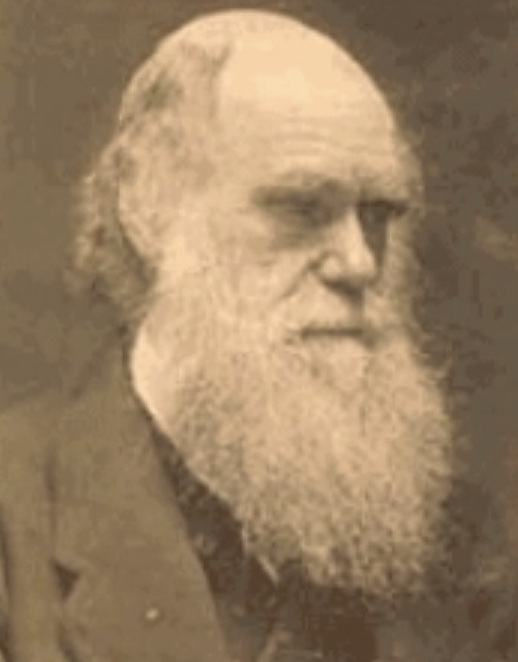
On this date in 1809, Charles Robert Darwin was born in England. He prepared for the Church at Cambridge, but his passion was natural history. During his work as a naturalist for nearly five years, starting in 1831 when he was 22, on the HMS Beagle, he began documenting and formulating his theory of evolution.
At the time he published his monumental On the Origin of Species (1859), he still accepted the “First Cause” argument. Gradually he threw off his religious beliefs. In his Descent of Man (1871), Darwin wrote: “Many existing superstitions are the remnants of former false religious beliefs. The highest form of religion — the grand idea of God hating sin and loving righteousness — was unknown during primeval times.”
He wrote the Rev. J. Fordyce on July 7, 1879, that “an agnostic would be the most correct description of my state of mind.” Darwin penned his memoirs between the ages of 67 and 73, finishing the main text in 1876. These memoirs were published posthumously in 1887 by his family under the title Life and Letters of Charles Darwin, with his hardest-hitting views on religion excised. Only in 1958 did Darwin’s granddaughter Nora Barlow publish his Autobiography with original omissions restored (see excerpt below). (D. 1882)
“I can indeed hardly see how anyone ought to wish Christianity to be true; for if so the plain language of the text seems to show that the men who do not believe, and this would include my Father, Brother, and almost all my best friends, will be everlastingly punished. And this is a damnable doctrine.”
— "The Autobiography of Charles Darwin" (1887)
Abraham Lincoln
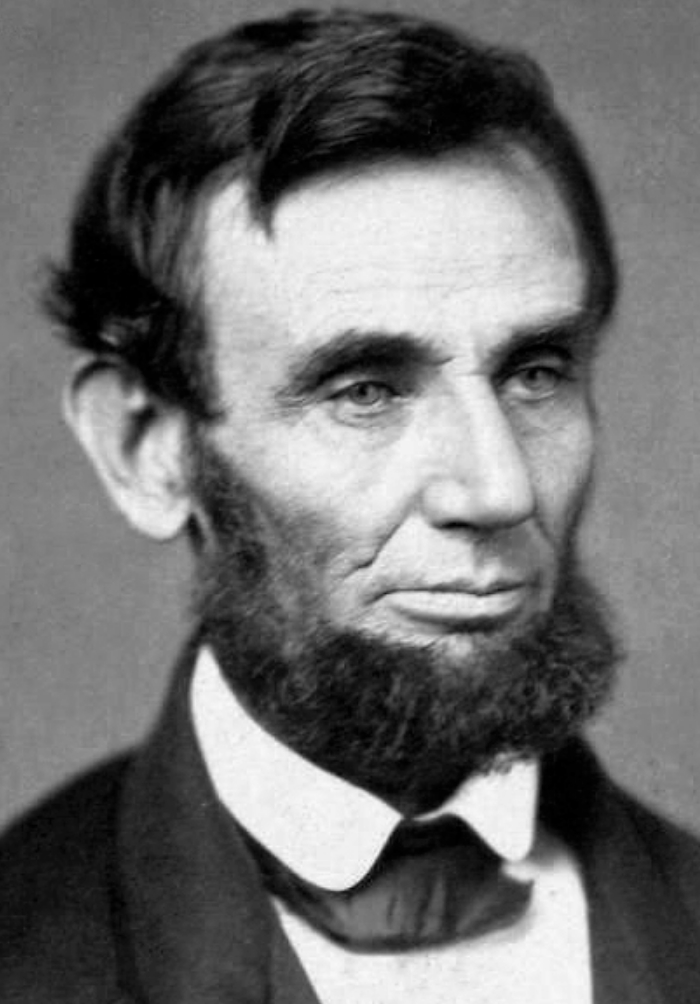
On this date in 1809, the 16th U.S. president, Abraham Lincoln, was born in Hardin County, Kentucky. Largely self-educated, he worked on farms, splitting those famous rails, and clerking at a store. Lincoln spent eight years in the Illinois Legislature and also rode the circuit of courts for many years. He married Mary Todd; only one of their four sons lived to adulthood. While seeking the nomination for Congress, Lincoln ruefully wrote Martin M. Morris, of Petersburg, Illinois, that “There was the strangest combination of church influence against me .. everywhere contended that no Christian ought to vote for me because I belonged to no Church, [and] was suspected of being a Deist.” (March 26, 1843, Complete Works of Abraham Lincoln, Nicolay & Hay edition.)
Lincoln ran against Stephen A. Douglass for U.S. senator in 1858, losing the election but winning a national reputation. Elected as a Republican as president in 1860, Lincoln guided the nation during the Civil War, issuing the Emancipation Proclamation on Jan. 1, 1863, which freed slaves within the Confederacy. He won reelection in 1864. His wise plans for peace (“With malice toward none; with charity for all”) were foiled by an assassin’s bullet on April 14, 1865, at Ford’s Theatre in Washington, D.C.
Among the words inscribed at the Lincoln Memorial are Lincoln’s Second Inaugural address, which, though full of conventional references to the “Almighty,” astutely observes of the North and the South: “Both read the same Bible and pray to the same God, and each invokes His aid against the other. It may seem strange that any men should dare to ask a just God’s assistance in wringing their bread from the sweat of other men’s faces, but let us judge not, that we be not judged.”
While Lincoln punctuated his eloquent speeches with deistic references to “Divine Providence,” in which he firmly believed, he was strongly rationalist and not conventionally Christian. Among the friends who testified to that was Ward Hill Lamon in Life of Abraham Lincoln (1872). Lamon, who was religious, had known Lincoln for years and wrote: “Perhaps no phrase of his character has been more persistently misrepresented and variously misunderstood than this of his religious belief.”
Lamon related how Lincoln wrote a “little book,” probably an extended essay, to prove “First, that the Bible is not God’s revelation. Second, that Jesus was not the Son of God.” He took the manuscript to Samuel Hill, a shopkeeper and unbeliever, whose son considered the work “infamous.” Hill reportedly snatched the book from Lincoln and threw it into the fire to protect Lincoln’s political career, a story other contemporaries corroborated had been told them.
“But he never told anyone that he accepted Jesus as the Christ,” Lamon noted. His book also quotes Lincoln’s first law partner, John T. Stuart: “Lincoln went further against Christian beliefs and doctrines and principles than any man I ever heard: he shocked me.” David Davis, who knew Lincoln for 20 years and rode with him on the court circuit, told Lamon: “He had no faith, in the Christian sense of the term.” (D. 1865)
PHOTO: Lincoln on Nov. 8, 1863, 11 days before the Gettysburg Address; photo by Alexander Gardner.
“Mr. Lincoln was never a member of any Church, nor did he believe in the divinity of Christ, or the inspiration of the Scriptures in the sense understood by evangelical Christians.”
“When a boy, he showed no sign of that piety which his many biographers ascribe to his manhood. When he went to church at all, he went to mock, and came away to mimic.”
“When he came to New Salem, he consorted with Freethinkers, joined with them in deriding the gospel story of Jesus, read Volney and Paine, and then wrote a deliberate and labored essay, wherein he reached conclusions similar to theirs.”
— "The Life of Abraham Lincoln" by Ward H. Lamon (1872)
George Meredith
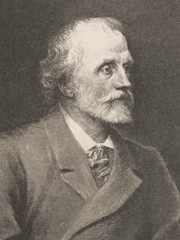
On this date in 1829, novelist and poet George Meredith was born in Portsmouth, England. His mother died when he was 5 and when his father later had to declare bankruptcy, George was sent to live with relatives. At 15 he had his only formal education when he was sent to a Moravian school for less than two years. Apprenticed to a solicitor, he jettisoned legal work when he began writing articles and poetry for magazines. Poems (1851) was followed by The Shaving of Shagpat (1855), neither very successful. He wrote 19 novels, the last published posthumously in 1910.
He worked as a reporter, read for a book publishing company and was a war correspondent. Among the writers he encouraged were Thomas Hardy and Olive Schreiner. He married widow Mary Ellen Nichols, who was seven years older than him, in 1849. She became the role model for many of his heroines. It was not a successful marriage. She eloped with an artist in 1858, leaving their one surviving child with him, and died three years later.
The Ordeal of Richard Feverel, (1859), a semi-autobiographical account of his marriage, had better success. Meredith married Marie Vulliamy in 1864. Other books include The Egoist (1879) and Diana of the Crossroads (1885). He was quoted in Fortnightly Review in July 1909 saying: “The man who has no mind of his own lends it to the priests.” He was nominated seven times for the Nobel Prize in Literature. (D. 1909)
“When I was quite a boy, I had a spasm of religion which lasted about six weeks, during which I made myself a nuisance in asking everybody whether they were saved. But I never since have swallowed the Christian fable.”
— Meredith, quoted in "Memories" by Edward Clodd (1916)
François-Désiré Bancel
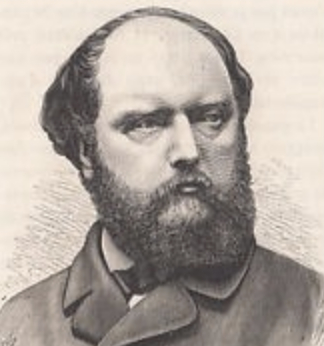
On this date in 1822, François-Désiré Bancel was born in France. He was educated at Touron and Grenoble, became a lawyer and then a member of the Legislative Assembly in 1849. Bancel was known as one of the most passionate critics of the royalists and clerics. After Napoleon III expelled him in 1852, he moved to Brussels and taught at the Free University.
A deist, according to freethought historian Joseph McCabe, he “gave great assistance in the Belgian Rationalist movement.” Bancel was again elected to the legislature in 1869 upon his return to France. A boulevard in Valence and a street in Lyon bear his name. (D. 1871)
Judy Blume
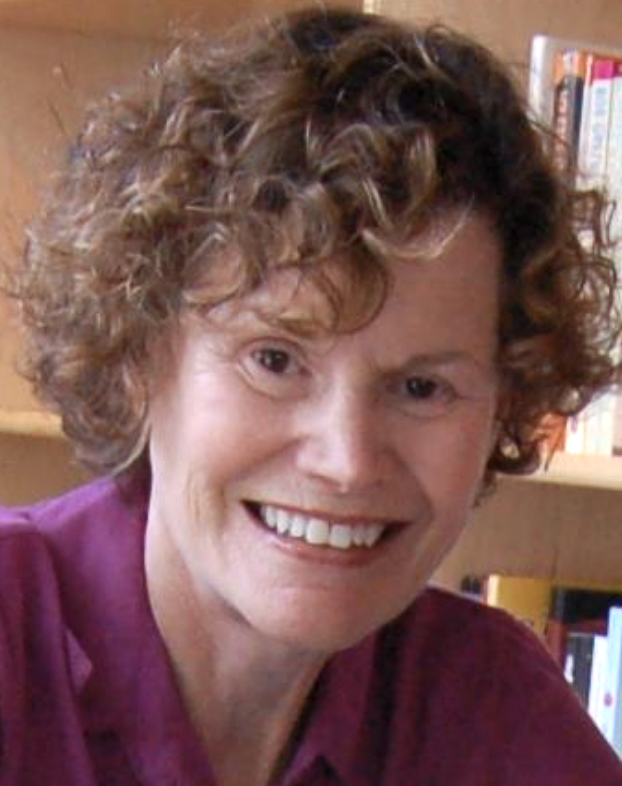
On this date in 1938, author Judith Blume (née Sussman) was born in Elizabeth, N.J., the daughter of homemaker Esther (Rosenfeld) and dentist Rudolph Sussman. Blume has described her home as culturally Jewish rather than religious. Her father had six brothers and sisters, almost all of whom died while she was young, so “a lot of my philosophy came from growing up in a family that was always sitting Shiva.” (Shalvi/Hyman Encyclopedia of Jewish Women)
When she was in third grade, she moved with her mother and her older brother David to Miami Beach in hopes the climate would help David recuperate from a kidney infection. Her father stayed in New Jersey. It was then Blume’s “personal relationship” with God started because she thought it was up to her to protect her father.
“I had to keep him safe. I had to keep him well — a terrible burden, you know, for a 9-year-old kid — or 8, really, when I left. And so I would make all kinds of bargains with God. And I had little prayers that I repeated a certain number of times a day. And I hung on to it for a while.” (NPR “Fresh Air,” April 24, 2023)
She was an introspective girl who loved to read. Asked as an adult which of her books was most autobiographical, she said it was Starring Sally J. Freedman as Herself (1977). “Sally is the kind of girl I was at ten. Curious and imaginative, but also a worrier.” (judyblume.com)
After graduating from an all-girls high school, she earned a B.A. in education from New York University in 1960. In 1959 her father had died and she married John Blume, an attorney. Their daughter Randy was born in 1961 and son Lawrence in 1963. After their divorce in 1975, she married Thomas Kitchens, a physicist. They moved to New Mexico for his work and divorced in 1978. In 1987 she married George Cooper, an attorney and nonfiction writer, and as of this writing in 2023 they live in Key West, Fla., and operate a bookstore. Both survived cancer. It’s tough to beat pancreatic cancer but he did, and Blume had a mastectomy in 2012 due to breast cancer.
Blume had started writing after her children were in nursery school but collected a lot of rejection slips until 1969 when her picture book The One in the Middle Is the Green Kangaroo was published. It was the start of something big. As of 2023, her 29 books, all but four for children and teens, have sold more than 90 million copies in 39 languages.
The best-seller success of Are You There God? It’s Me, Margaret (1970) was a turning point for Blume. “She acknowledges that it was the first book she gave herself permission to write from her own experience, and it was then that she began to grow ‘as a writer and as a woman.’ ” (Ibid., Shalvi/Hyman) Margaret has a Christian mother and a Jewish father, asks God to help her choose a religion and prays at age 11 to experience puberty. The story closes with her stuffing her bra with cotton balls. Abby Ryder Fortson played the title character in the 2023 film adaptation directed by Kelly Fremon Craig.
Blume said she “was kind of angry at organized religion there for a while, and I wanted it to be different. … [W]e tried joining a synagogue and sending the kids to Sunday school. It didn’t work for me. I just felt they were learning things that I didn’t like, and they were not bat and bar mitzvahed. (Ibid., “Fresh Air”)
Some of her books for young adults were controversial because of the topics she tackled such as family conflict, gender, sexuality, bullying, body image and normal bodily functions. The novel Forever (1975) was frequently banned for its portrayal of teen sex. Are You There God? and others have also been removed from library shelves after religious conservatives complained.
Her work regularly appears on lists of “most frequently challenged authors.” She has served as a spokesperson for the National Coalition against Censorship. The documentary “Judy Blume Forever” directed by Davina Pardo and Leah Wolchok premiered at the 2023 Sundance Film Festival and was released on Prime Video in April 2023.
She was the subject of the Proust Questionnaire in the May 2023 Vanity Fair. Asked how she would like to die, Blume said: “Okay, if I have enough time I might go to Switzerland and drink the drink. I believe in euthanasia. What we do for our beloved pets, we should be able to do for our beloved humans or ourselves.”
Her heroes? “The surgeon, oncologists, and nurses who were there for George and saved his life.”
PHOTO: Blume in 2009; Carl Lender photo under CC 2.0.
TERRY GROSS: What were your children being taught in Sunday school that you didn’t approve of?
BLUME: “I didn’t like how much we are the chosen people, and we are different, and we are better. I didn’t like that.”— National Public Radio "Fresh Air" (April 24, 2023)
Cliff Bleszinski
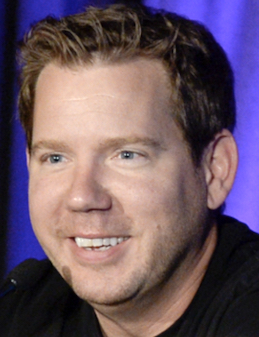
On this date in 1975, video game mastermind Cliff Bleszinski, aka CliffyB, was born to Karyn and Walt Bleszinski and grew up in Andover, Mass. He would go around the house impersonating “Saturday Night Live” characters, and in sixth grade successfully auditioned at his mother’s behest as Michael Darling in a local production of “Peter Pan.”
A self-described “drama geek” in high school, he played Mercutio in “Romeo and Juliet” and was a lead in productions of “Rumors” and “Ten Little Indians.” He would later say drama was his second love after video games. He garnered mention in the first issue of Nintendo Power magazine when he was 13 for earning a high score of just 50 points under 10 million on Super Mario Bros. At 15, he came in second at the Nintendo World Championships.
Bleszinski started his own company, Game Syndicate Productions, as a teen with the Palace of Deceit game in 1991. His father, a Polaroid engineer, had died the previous year of a heart attack when Bleszinski was 15. The loss was one of two unsettling events in his early life. The other was being molested at about that same time by a man he met in an online chat room. “I was perfect prey for him,” he wrote in his memoir “Control Freak” (2022): “All these years later I still struggle with what happened: Was I that naive?”
His mother moved him and his two brothers with her to California. Joining Epic Games in 1992, he had his first major career success co-developing Jazz Jackrabbit, which became Epic’s best-selling game. Further design milestones came with the Unreal game in 1998 that spawned a franchise and the Gears of War series launched in 2006.
Bleszinski left Epic in 2012 and co-founded Boss Key Productions in 2014 in Raleigh, N.C. The company closed in 2018 after some financial flops. He married professional gamer Lauren Berggren in 2012. “My greatest triumph would have to be finding and eventually marrying my amazing wife. I still have no idea how I landed her.” (Reddit forum, Sept. 14, 2012)
His relationship with his mother, now deceased, was fraught at times after the death of his father, he wrote in “Control Freak.” She was prone to ignore him, and when he bought her a car after getting his first big payout, she told him “Shaq bought his mom a house,” referring to NBA star Shaquille O’Neal. Bleszinki’s net worth was estimated at $16 million as of this writing in 2024.
He could also be outspoken about his lack of religious beliefs. “OK look, religion gives a lot of dumb people purpose in life. It builds communities. I get it. But history has shown, time and time again, that it is misused for misery and profit. All usually built on ‘what happens when you die?’ Spoiler: NOTHING.” (X, formerly Twitter, May 29, 2023) Ten years before that, therealcliffyb tweeted “And I’m not Jewish. I’m an Atheist.” He has over 200,000 followers on X.
After Boss Key shuttered, Bleszinski opened two restaurants in Raleigh and returned to theater, co-producing Anaïs Mitchell’s musical “Hadestown,” which opened on Broadway in 2019 and won eight Tony Awards. He subsequently invested in the 2019 Broadway revival of Terrence McNally’s “Frankie and Johnny in the Clair de Lune.”
He made his comics debut in 2023 with “Scrapper” in collaboration with Alex De Campi and Sandy Jarrell. The sci-fi series focused on a dog who rebels against the controlling forces of a post-apocalyptic city.
PHOTO: Bleszinski at Game Developers Conference 2016 in San Francisco; GDC photo under CC 2.0.
“For me, my personal religion is pretty much technology and games. I worship the pixel. I believe that technology has set us free, and video games in our culture are a wonderful, playful unifying force.”
— Polygon interview (March 22, 2013)
